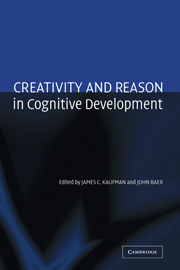Book contents
- Frontmatter
- Contents
- List of Contributors
- Acknowledgments
- Creativity and Reason in Cognitive Development
- Introduction
- COGNITIVE PERSPECTIVES
- 1 Expertise and Reason in Creative Thinking: Evidence from Case Studies and the Laboratory
- 2 Creative Genius, Knowledge, and Reason: The Lives and Works of Eminent Creators
- 3 Dynamic Processes Within Associative Memory Stores: Piecing Together the Neural Basis of Creative Cognition
- 4 The Creativity of Everyday Moral Reasoning: Empathy, Disgust, and Moral Persuasion
- 5 Reasoning and Personal Creativity
- 6 Alternative Knowledge Structures in Creative Thought: Schema, Associations, and Cases
- 7 The Role of the Knowledge Base in Creative Thinking
- 8 The Role of Domain Knowledge in Creative Problem Solving
- 9 Creative Thinking and Reasoning: Can You Have One Without the Other?
- 10 From Alexithymia, Borne of Trauma and Oppression, to Symbolic Elaboration, the Creative Expression of Emotions, and Rationality
- 11 Opening up Creativity: The Lenses of Axis and Focus
- DEVELOPMENTAL AND EDUCATIONAL PERSPECTIVES
- Author Index
- Subject Index
- References
1 - Expertise and Reason in Creative Thinking: Evidence from Case Studies and the Laboratory
Published online by Cambridge University Press: 19 January 2010
- Frontmatter
- Contents
- List of Contributors
- Acknowledgments
- Creativity and Reason in Cognitive Development
- Introduction
- COGNITIVE PERSPECTIVES
- 1 Expertise and Reason in Creative Thinking: Evidence from Case Studies and the Laboratory
- 2 Creative Genius, Knowledge, and Reason: The Lives and Works of Eminent Creators
- 3 Dynamic Processes Within Associative Memory Stores: Piecing Together the Neural Basis of Creative Cognition
- 4 The Creativity of Everyday Moral Reasoning: Empathy, Disgust, and Moral Persuasion
- 5 Reasoning and Personal Creativity
- 6 Alternative Knowledge Structures in Creative Thought: Schema, Associations, and Cases
- 7 The Role of the Knowledge Base in Creative Thinking
- 8 The Role of Domain Knowledge in Creative Problem Solving
- 9 Creative Thinking and Reasoning: Can You Have One Without the Other?
- 10 From Alexithymia, Borne of Trauma and Oppression, to Symbolic Elaboration, the Creative Expression of Emotions, and Rationality
- 11 Opening up Creativity: The Lenses of Axis and Focus
- DEVELOPMENTAL AND EDUCATIONAL PERSPECTIVES
- Author Index
- Subject Index
- References
Summary
The thesis of this chapter is that knowledge and reason play an important role in creative thinking. I equate knowledge and expertise (e.g., Ericsson, 1996, 1998, 1999; Weisberg, 2005), the capacity to perform at a high level, acquired through practice (e.g., an expert pilot); or the possession of exceptional knowledge, acquired through study (e.g., an expert on medieval art). Reason is the ability to draw conclusions, a process in which one thought follows from another as the result of deduction or induction. Creative thinking refers to processes underlying production of creative products, which are novel works – or innovations – brought about through goal-directed activities. Thus, we examine the hypothesis that skill and knowledge, as well as reasoning processes, play important roles in innovation. That hypothesis is of interest because much theorizing concerning creative thinking assumes exactly the opposite, that is, that expertise and reason cannot support creative thinking (e.g., Csikszentmihalyi, 1996; Simonton, 2003; Sternberg, 1996). I first consider two general orientation issues: the definition of creativity and whether expertise and reasoning should be considered separate. I then examine the negative view concerning expertise and reason in creativity, which I call the tension view. I then present evidence, from case studies of creative achievements as well as from laboratory studies of problem solving, that expertise and reason play critical roles in creative thinking.
Information
- Type
- Chapter
- Information
- Creativity and Reason in Cognitive Development , pp. 7 - 42Publisher: Cambridge University PressPrint publication year: 2006
References
Accessibility standard: Unknown
Why this information is here
This section outlines the accessibility features of this content - including support for screen readers, full keyboard navigation and high-contrast display options. This may not be relevant for you.Accessibility Information
- 45
- Cited by
